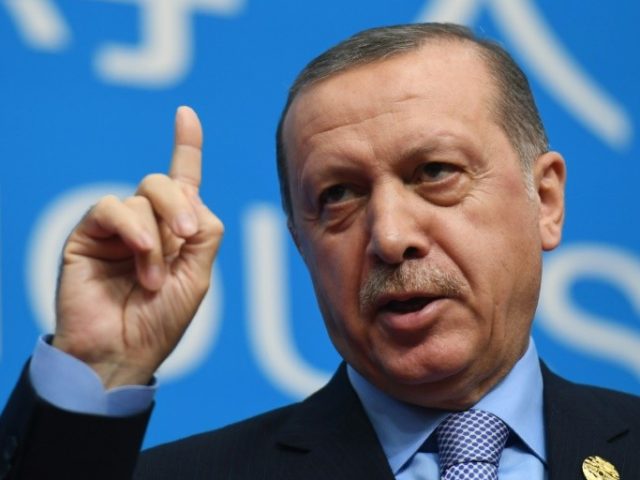American and Turkish diplomats scramble to restore non-immigrant visa services in both nations, and Turkish President Recep Tayyip Erdogan has taken an aggressive approach. He asserted Thursday that Turkey is “not a tribal state” and told the United States, “We do not need you.”
Erdogan added that the current diplomatic crisis – in which both Turkish and American embassies have ceased processing non-immigrant visas, essentially prohibiting most citizens of one nation from visiting the other – was the product of unilateral action by American Ambassador to Ankara John Bass, despite the State Department’s asserting that Bass had acted in concert with the Trump administration leadership in Washington.
“We are not a tribal state. We are the state of the Republic of Turkey and you will accept it. If you don’t, then sorry but we do not need you,” Erdoğan told reporters Wednesday, according to Turkish newspaper Hurriyet. Of Bass, he said, “If an ambassador in Ankara is governing the United States, it is a shame.”
Erdogan also protested that the United States had refused to sell weapons to Turkey – forcing Erdogan to buy inferior Russian technology – claiming that the Trump administration is “providing arms to the terrorist organization for free.”
“The terrorist organization” in question is the Syrian Kurdish Peoples’ Protection Units (YPG/YPJ), an anti-Islamist militia noted for its success in fighting the Islamic State.
The state-run Anadolu Agency adds that Erdogan continued to attack Bass, asserting, “It is unacceptable for the U.S. to sacrifice Turkey’s strategic partnership for an impertinent ambassador. It is impossible for us to say ‘yes’ to this.”
The mutual visa suspension policy followed the arrest of two Turkish workers at the U.S. consulate in Istanbul. One of the individuals, identified as Metin Topuz, stands accused of ties to Fethullah Gulen, an Islamist cleric whom Erdogan blames for the 2016 failed coup against his government. Gulen, who resides in Pennsylvania, denies all charges, and the United States has asserted it does not have sufficient evidence to extradite him. American officials also confirmed their Turkish counterparts have not provided them evidence on the accusations against Topuz.
The arrests have led the head of the nation’s largest opposition party, the Republican People’s Party (CHP), to accuse Erdogan of implementing a “hostage policy” towards America.
Ibrahim Kalin, a spokesman for Erdogan, implored American officials to reconsider their policy and give the Turkish judiciary time to process Topuz and the other worker. “The taking of testimonies and inquiries [into] these people continues. Let the jurisdiction make the necessary decision about this issue,” he told reporters in Istanbul. “The U.S. or any other country should respect the legal procedure in Turkey.”
Kalin adopted a more cooperative tone than Erdogan. “Away from a revanchist attitude, we hope that they adopt a positive and constructive attitude in solution to this issue, within the frame of legal and diplomatic laws,” he stated. “For us, there is not a complicated picture. The suspension of visa applications is quite a simple issue. It can be solved in a day.”
At the highest diplomatic level, Secretary of State Rex Tillerson spoke on the phone with Turkish Foreign Minister Mevlut Cavusoglu on Wednesday. According to the State Department, Tillerson “conveyed to the Foreign Minister his profound concern over the detentions of Turkish national employees of our diplomatic mission to Turkey and of several American citizens.” The statement does not mention the visa issue.
Deputy Prime Minister Bekir Bozdag additionally confirmed on Thursday that U.S. diplomats would meet with Turkish officials to attempt to resolve the dispute. “A decision between the two countries has been made for representatives to come together and work on this issue,” he told the Haber Turk television network.
Daily Sabah, a newspaper that is typically moderately favorable to Erdogan, published a column Thursday accusing the Turkish government of being “completely unprepared” for the U.S. to cease issuing non-immigrant visas. Some officials, the article claims, “were baffled by the U.S. reaction. Even the Russian government, a historic American foe, did not get such treatment following their apparent attempts to manipulate the 2016 presidential elections.”
Sabah postulates that Turkish officials may have underestimated President Donald Trump’s outrage over the arrest of American Christian pastor Andrew Brunson – also accused of being a supporter of Gulen’s Islamic movement, despite his decades of Christian proselytizing – over which “the water was already boiling.”

COMMENTS
Please let us know if you're having issues with commenting.